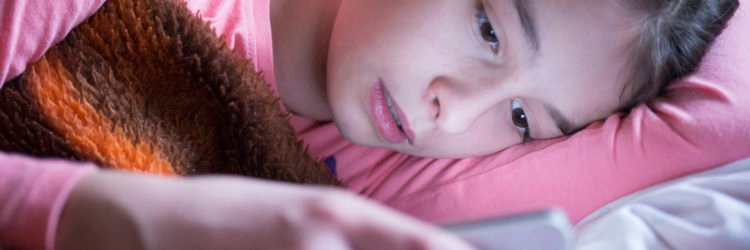Laying down in bed, closing your eyes, and falling asleep may sound natural to many, but it is actually a learned skill for children. As with many learned skills, children should be set up for success by their caregivers to make sure that they have the best chance of easily falling asleep, and most importantly, staying asleep. Even well into their teenage years, kids need an average of 9-11 hours of sleep every night to stay healthy. With school, homework, after school activities, and sports, it can sometimes seem like there are not enough hours in the day to reach these kind of numbers.
Studies are showing that one of the big culprits robbing kids of their much-needed sleep is the overuse of electronic devices, especially in their bedrooms. Not only is overuse of technology associated with lack of sleep in actual number of hours, it is also known to affect the quality of sleep, since it can disrupt the circadian rhythm.
Researchers are reporting that 72% of all kids and 89% of adolescents have at least one mobile device in their bedroom, with a majority using them around bedtime. The digital devices are psychologically stimulating, making it harder to rest and get to bed properly. The lights that the devices produce also affect people, disrupting the circadian timing, which makes falling asleep difficult.
The American Association of Pediatrics recently revised their recommendations on screen time for children. Kids aged 2-5 should be limited to one hour a day, and kids 6 and older should use it sparingly, at the discretion of their caregivers. Kids 18 months and younger should have no screen time at all. These numbers might seem difficult for some people to follow, but shifting the focus away from screens can lead to many positive outcomes, including better sleep.
Experts advise parents to keep mobile devices in common areas of the house and out of the bedrooms. This makes it easier to monitor the amount of time kids are using the devices, as well as keeping an eye on the content and making sure it’s age appropriate. Put down the devices when it gets close to bedtime and shift to creative play, reading books, or just general relaxation and spending a little bit of time unplugged.



 Close
Close